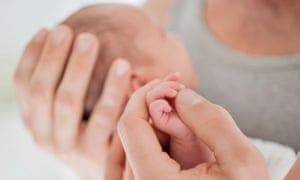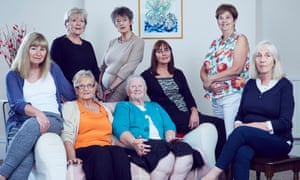Call for public inquiry over church-led adoptions that coerced young single mothers into giving up their babies

Photograph: Tom Merton/Getty Images/Caiaimage
Pressure is mounting for a public inquiry into the adoption of hundreds of thousands of babies born to unmarried women over a 30-year period amid claims from some mothers who say they were coerced into handing over their children.
A letter will be sent to the home secretary, Amber Rudd, next week from solicitors at two eminent law firms calling on her to convene a public inquiry into historical adoption practices in the UK. The solicitors say an inquiry would uncover the truth about the practices – stretching over three decades after the end of the second world war – and hold agencies to account.
Meanwhile more women have come forward to tell their stories of being pressured into having their babies adopted.
The call for an inquiry will be sent to Rudd on Thursday, the day after the broadcast of a television documentary relating the stories of several women. That film has prompted an apology from Cardinal Vincent Nichols, head of the Catholic church in England and Wales, and a statement expressing regret from the Church of England. Religious institutions and agencies handled most adoptions until 1976, after which the process became the responsibility of local authorities.
Carolynn Gallwey, of Bhatt Murphy Solicitors, and Karon Monaghan, of Matrix Chambers, are demanding an inquiry to acknowledge the trauma suffered by young vulnerable mothers and the impact on their lives. On a practical level, they say an inquiry could lead to records being made available and professional counselling offered.
“It is the only way to get a proper understanding of what happened and identify any systemic issues which amounted to coercion, whether there were policies – formal or informal – which discouraged young women from keeping their babies,” said Gallwey.
About half a million babies, most born to unmarried women, were adopted in the 1950s, 60s and 70s when the Catholic church, Church of England and the Salvation Army ran “mother and baby homes” and adoption agencies in the UK. Adoption reached a peak in 1968, when more than 16,000 babies born to unmarried mothers were handed over to new families.
In recent years, some women have publicly said they feel they were effectively forced to hand over their babies. Now mostly in their 60s and 70s, they say that as vulnerable young women they were made to feel shame and guilt, and were told that adoption was in the best interests of themselves and their babies.
“There is a very compelling set of facts from a recent period of our history which is still having an impact now,” said Gallwey. An inquiry, she added, could “correct the myth that these women gave away their babies voluntarily”.
She added: “All the women I’ve spoken to say that [the women acted voluntarily] could not be further from the truth. The saddest thing is the number of women who say, ‘no one told me there was another way’. It’s still very raw even after so long.”
The call for a public inquiry was backed by Graham Allen, Labour MP for Nottingham North, who sponsored a parliamentary motion last year calling on the government to apologise for “unacceptable adoption and care practices of the past”.
He said an inquiry “would draw a line for everyone”, adding: “No monetary amount could compensate for what these people have been through, but it could be cathartic and cleansing.”
Veronica Smith, co-founder of the Movement for an Adoption Apology, also backed the call. “We’ve been trying to get something done for years. We want acknowledgement of bad practice – the coercion of often teenage girls into losing their children,” she said.

Now 75, Smith gave birth to a daughter in 1964 who was, she says, taken from her for adoption. “It has coloured the whole of my life,” she said.
She would be willing to testify to an inquiry. “But there are lots of women who can’t even verbalise what happened to them. They are screwed up with pain and shame and guilt. There are thousands who have never come forward, but every time there is publicity on this people make contact wanting to tell their story, often for the first time.”
Among the mothers and adopted children who responded to a Guardian appeal on Thursday was “Linda”, who became pregnant aged 15 in the early 1970s. “It was the ultimate sin. I was so scared that I didn’t tell my parents until it was too late to ‘do’ anything about it, by which time I was about seven months. I had been wearing girdles and starving myself so it wouldn’t show,” she said.
Linda’s parents arranged through a Catholic adoption agency for her to go to a mother and baby home. She said: “A nun came and told me she was just taking my baby [aged about three weeks] to weigh him. That was the last time I saw him. I was absolutely devastated. Within the family we agreed not to ever talk about it and to pretend it never happened … Every baby I saw on the streets made me want to steal it. I was seriously angry all the time but couldn’t talk about it.”
She added: “It’s my dirty little secret and I admit it has probably poisoned me a bit over the years. I think of it as the punishment that keeps on giving for doing what I did.”
Another woman, “Sandra”, lost her baby to adoption when she was 15, in the early 1970s. She said: “Physical and emotional consequences led me to be sterilised at age 25. I was far too traumatised to face another pregnancy and did not receive adequate health care after the birth, leading to a great deal of pain. I still suffer from PTSD. I grieve for my lost child every day and will do so until I die.”
“Janet” said that her husband had been adopted in 1963 through a Church of England agency. “He was subject to the most awful neglect and abuse mainly at [the adoptive mother’s] hands. There is a lot of emphasis put on the way the [birth] mothers were treated but little said about the fate of those babies that the church felt justified in giving to so-called Christian families,” she said.
Duncan Roy said he had been born in a Catholic mother and baby home in Kent when his mother was 16. “To do penance for the sin of getting pregnant out of wedlock she had to scrub floors every day she was there until I was born. She was verbally and physically abused by the nuns in the home,” the 56-year-old said. “When I was born I was taken away from her, but because I was half-Iranian and a dark baby they couldn’t find anyone to adopt me. Eventually my grandmother decided to take me back and raise me as hers. The whole experience had a huge effect on my mother’s life. She was very badly traumatised by her experiences at the home.”
Britain’s Adoption Scandal: Breaking the Silence will be broadcast on ITV at 9pm on Wednesday 9 November